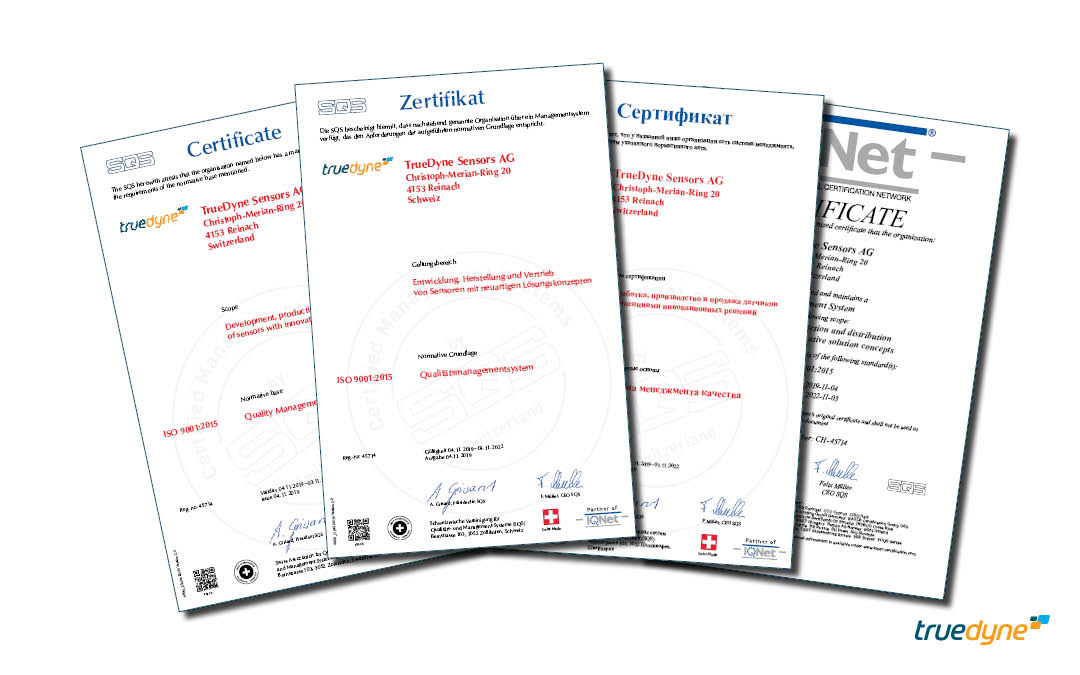ISO 9001:2019 certification
Why do we get certified?
- The DIN EN ISO 9001:2015 standard is an international standard that demonstrates high levels of quality to customers and third parties.
- It serves as a catalogue of requirements for a quality management system.
- The results are optimised internal company processes, minimised rejects, resource conservation, and increased customer and employee satisfaction.
- An independent certification body confirms compliance with these standards.
- The aim of the standard is to understand and implement the requirements that interested parties expect the company to meet.

The seven principles of quality management
The ISO 9000 standard explains the seven principles of quality management. They form the basis of quality management and are an important part of applying ISO 9001:2015 appropriately. They are:
- Customer focus
- Leadership
- Engagement of people
- Process approach
- Continuous improvement
- Evidence-based decision-making
- Relationship management
Based on this, we apply practices such as risk-based thinking, a process approach and the PDCA cycle throughout our entire quality management system.
The PDCA cycle
The PDCA cycle is a model for sustainably optimising the quality management system in companies. It is a four-step method:
- Plan – Determine improvement goals and define necessary measures
- Do – Implement measures from the planning phase, document results
- Check – Evaluate collected data to make an objective assessment of whether targets have been achieved
- Act – Reflect on process and integrate effective improvement measures
This cycle helps to solve problems efficiently and offers several other advantages, such as enabling companies to prevent recurring errors and continuously improve work processes.
Corporate policy of TrueDyne Sensors AG
TrueDyne Sensors AG supports the decision of Endress+Hauser Flowtec AG not to formulate a fully integrated management policy. In our opinion, this enables clearer, more targeted formulations and statements, facilitates understanding for employees and customers, allows for faster and more flexible changes and, from our point of view, offers no disadvantages whatsoever.
Quality = customer satisfaction
We want satisfied and loyal customers
This is why we define quality as customer satisfaction and focus on generating outstanding customer benefits. Through satisfaction, we want to achieve customer loyalty and lasting relationships. All of our planning and actions must be geared to this. Everything we do must also be viewed from the customer’s perspective and must always be based on this key question: “Is what we are doing or planning to do useful and beneficial for our customers, or are we merely concentrating on our company’s growth?” Customer orientation is an essential part of our corporate identity.
We strive for zero defects in products and services
This is an indispensable prerequisite for customer satisfaction and loyalty. Every mistake affects our customers, disrupts their normal processes, and can have serious and perhaps even unforeseeable consequences. Every mistake costs our customers time and money, causes problems, and ultimately dissatisfaction. Over time, dissatisfied customers become disloyal and prefer to obtain their services and products elsewhere. Every customer that we lose weakens our company and strengthens our competitors. It is extremely difficult to win them back. Zero defects can only be achieved if the entire product life cycle is designed and aligned accordingly – from market analysis and product definition to development, production, sales, and shipping. This means that every employee must contribute to the overall effort.
We strive for Operational Excellence
In our company, we apply the LEAN principles to strengthen our focus on operational excellence and thus optimize the quality and flexibility of our products as well as our business processes. As a result, we systematically identify and eliminate activities and processes that do not generate added value through continuous improvement. Our fundamental approach is based on the Kaizen Continuous Improvement Process and we do everything we can to transmit this LEAN culture to our main suppliers.
We create products and services that we can be proud of
We develop, produce, and sell products and services that offer outstanding customer benefits and contribute significantly to improving customer loyalty thanks to their zero-defect quality. That is why we are proud of what we do. This also means that products and services are only provided or supplied to customers if we are convinced that they deliver the required and promised customer benefits, if they function perfectly, and are fault-free.
We want to promote a positive error culture that sees errors as an opportunity for improvement.
If an error leads to a customer complaint, our highest priority is to restore customer satisfaction. Like errors, complaints also provide an opportunity for improving our products and our understanding of customers. If, despite our best efforts, we are unable to restore our customer’s trust, we must use this lesson learned to discover and recognize the causes, and improve our future approaches.
We are reliable
I am responsible for quality and continuous improvement.
I – and not just the others – am responsible for quality, continuous improvement, and customer satisfaction. As a company, we must constantly improve ourselves, our procedures, and our management system – and I play a key role in this process. What is good today may not be good enough tomorrow. In order to keep satisfied and loyal customers in the long term, we cannot rest on our laurels. That is why CIP, the continuous improvement process, plays a crucial role in our understanding of quality, determines our daily actions, and ensures our progress.
